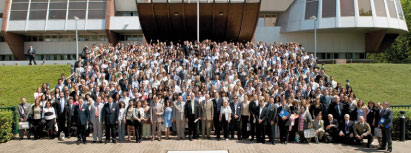The Europe of Strasbourg: The Schools of Political Studies of the Council of Europe
Established in 1992, in Moscow, the first School of Political Studies of the Council of Europe has aimed to promote the fundamental values on which the European project was founded at the end of the Second World War: democratic pluralism, human rights and the rule of law. Since then 20 other Schools have been set up along the same lines under the auspices of the Council of Europe. They now constitute a genuine Network of young politicians covering the whole of Eastern and South-Eastern Europe, the Caucasus and, since 2012, Mediterranean region and countries of the Visegrad Group.
Young and committed participants
 The activities of the Council of Europe’s Schools of Political Studies are based on seminars organised in each participating country. They bring together a group of approximately 30 young politicians, elected both nationally and locally, civil servants, leaders of civil society and journalists. They all mirror each country’s social and cultural characteristics.
The activities of the Council of Europe’s Schools of Political Studies are based on seminars organised in each participating country. They bring together a group of approximately 30 young politicians, elected both nationally and locally, civil servants, leaders of civil society and journalists. They all mirror each country’s social and cultural characteristics.
Themes related to the European project
The seminars focus on themes such as European integration, globalisation, democratisation processes, frozen conflicts, intercultural dialogue, post-conflict reconciliation, organisation of free elections, strengthening of democratic institutions and the development of civil society.
Stronger and more active networks
Over the last few years, as the Schools’ Network has gradually expanded, co-operation has been established between different Schools which now hold regular bilateral and regional meetings facilitating dialogue and often contributing to reconciliation in divided countries and regions.
The creation of Alumni networks to strengthen the ties developed during the different activities has been encouraged. They include many members of government and parliament, local politicians, senior officials, businessmen, journalists, NGO leaders and lawyers.
Committed partners
The programme is funded by the Council of Europe and also benefits from contributions from member and observer states of the Council of Europe. The City of Strasbourg and other local authorities provide financial and political support to the World Forum for Democracy, as well as the French Government. The European Commission has also previously contributed to the programme, and continues to do so via the South Programme II.
From the Summer University for Democracy...
In 2006, participants from all of the Schools of Political Studies came together in Strasbourg for the first time to discuss common challenges to democracy across Europe. This gathering, known as the Summer University for Democracy, became a major meeting point for young leaders from new Europe to debate, exchange views and address common concerns. A total of six editions of the Summer University were held from 2006 to 2011.
Over the years, with the support of the local authorities of eastern France and the City of Strasbourg, the Summer University for Democracy attracted an increasing number of participants, therefore increasing synergies and fostering the creation of a worldwide network. Indeed, after six editions of the Summer University, it was developed into a larger-scale event called the World Forum for Democracy.
...to the World Forum for Democracy
Every year, all participants of the programme are invited to Strasbourg, in the Palais de l’Europe, to take part in the World Forum for Democracy which brings together over 1000 participants and experts, including Heads of State and Government, representatives of European institutions and the French government, and European and international academics. All of the Council of Europe Schools of Political Studies send a delegation to the World Forum each year.
For several years, within the framework of co-operation with the Organisation Internationale de la Francophonie, a group of participants from French-speaking Africa were invited to participate in the event with the purpose of developing the concept of Schools of Political Studies in Western Africa. Similar School initiatives have now been established in some of these countries. Recently, delegations from the Academy of Civic Education in Bishkek, Kyrgyzstan, have attended the World Forum as well.






